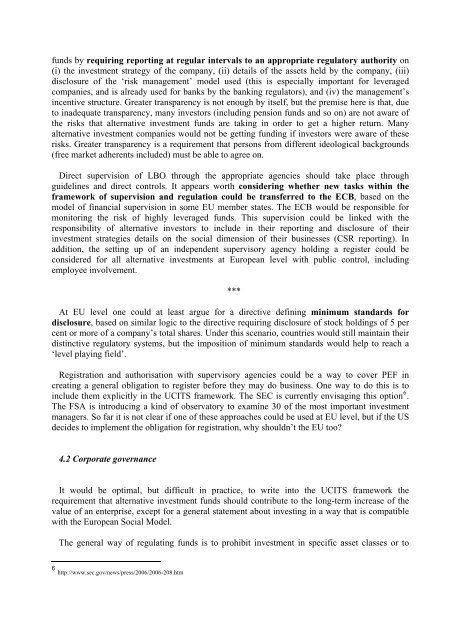Executive summary - Udo Bullmann
Executive summary - Udo Bullmann
Executive summary - Udo Bullmann
- No tags were found...
Create successful ePaper yourself
Turn your PDF publications into a flip-book with our unique Google optimized e-Paper software.
funds by requiring reporting at regular intervals to an appropriate regulatory authority on(i) the investment strategy of the company, (ii) details of the assets held by the company, (iii)disclosure of the ‘risk management’ model used (this is especially important for leveragedcompanies, and is already used for banks by the banking regulators), and (iv) the management’sincentive structure. Greater transparency is not enough by itself, but the premise here is that, dueto inadequate transparency, many investors (including pension funds and so on) are not aware ofthe risks that alternative investment funds are taking in order to get a higher return. Manyalternative investment companies would not be getting funding if investors were aware of theserisks. Greater transparency is a requirement that persons from different ideological backgrounds(free market adherents included) must be able to agree on.Direct supervision of LBO through the appropriate agencies should take place throughguidelines and direct controls. It appears worth considering whether new tasks within theframework of supervision and regulation could be transferred to the ECB, based on themodel of financial supervision in some EU member states. The ECB would be responsible formonitoring the risk of highly leveraged funds. This supervision could be linked with theresponsibility of alternative investors to include in their reporting and disclosure of theirinvestment strategies details on the social dimension of their businesses (CSR reporting). Inaddition, the setting up of an independent supervisory agency holding a register could beconsidered for all alternative investments at European level with public control, includingemployee involvement.***At EU level one could at least argue for a directive defining minimum standards fordisclosure, based on similar logic to the directive requiring disclosure of stock holdings of 5 percent or more of a company’s total shares. Under this scenario, countries would still maintain theirdistinctive regulatory systems, but the imposition of minimum standards would help to reach a‘level playing field’.Registration and authorisation with supervisory agencies could be a way to cover PEF increating a general obligation to register before they may do business. One way to do this is toinclude them explicitly in the UCITS framework. The SEC is currently envisaging this option 6 .The FSA is introducing a kind of observatory to examine 30 of the most important investmentmanagers. So far it is not clear if one of these approaches could be used at EU level, but if the USdecides to implement the obligation for registration, why shouldn’t the EU too?4.2 Corporate governanceIt would be optimal, but difficult in practice, to write into the UCITS framework therequirement that alternative investment funds should contribute to the long-term increase of thevalue of an enterprise, except for a general statement about investing in a way that is compatiblewith the European Social Model.The general way of regulating funds is to prohibit investment in specific asset classes or to6 http://www.sec.gov/news/press/2006/2006-208.htm





